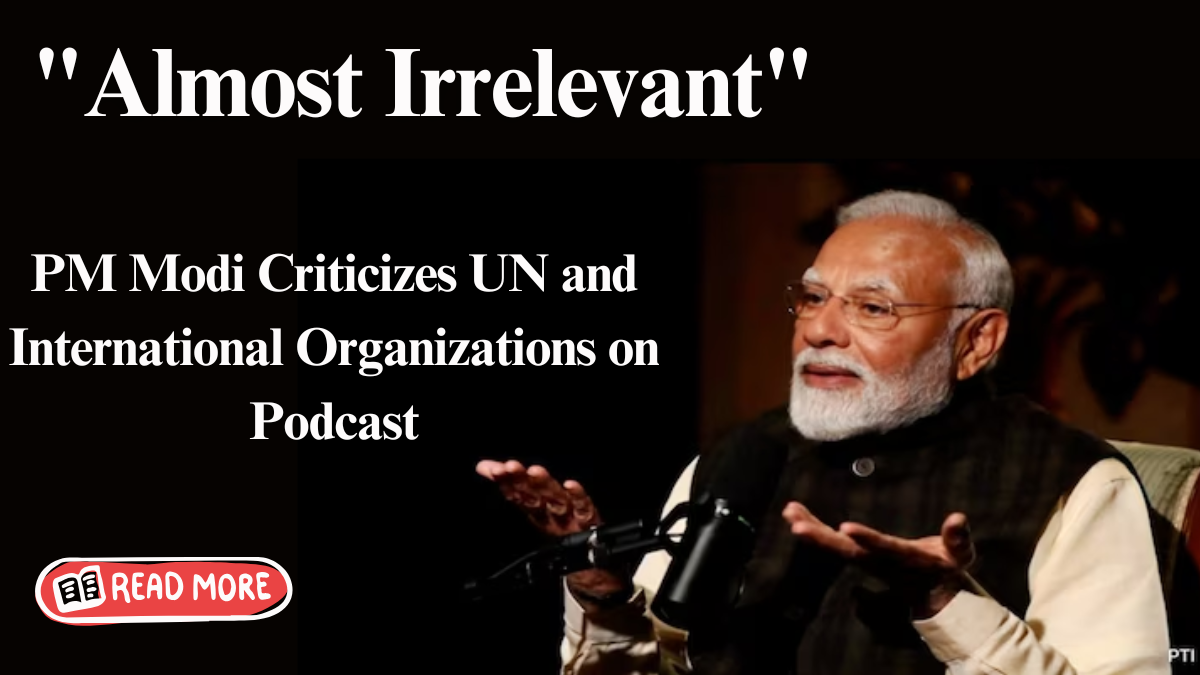In a candid podcast conversation, Prime Minister Narendra Modi expressed his frustration with the United Nations (UN) and other international organizations, calling them “almost irrelevant” in the context of addressing global challenges. His comments come amid growing tensions worldwide, highlighting the urgent need for change in global governance structures.

The Limitations Exposed by COVID-19
The COVID-19 pandemic has had a profound impact on the global economy, healthcare systems, and day-to-day life, pushing countries to their limits. In his podcast, PM Modi reflected on how the pandemic exposed several vulnerabilities in global governance, especially in terms of providing a coordinated response to such crises.
Countries, he said, were left to fend for themselves, with some nations struggling to obtain critical medical supplies, such as vaccines, masks, and ventilators. The inability of international organizations like the UN to swiftly mobilize resources and coordinate action during the pandemic highlighted their inefficiency, according to Modi.
A Call for Global Unity and Cooperation
Despite his criticism of international organizations, PM Modi expressed a hopeful message about the future, stressing that the lessons learned from the pandemic should not be ignored. He called for a renewed emphasis on global unity and collaboration, urging nations to set aside differences and work together towards common goals, particularly in areas like climate change, public health, and technological advancement.
The Prime Minister suggested that the future of international relations lies in fostering deeper partnerships based on mutual respect, shared interests, and a collective commitment to addressing pressing global issues. He emphasized that in today’s interconnected world, no nation can thrive in isolation, and only through cooperation can we overcome the complex challenges facing humanity.
Shifting Focus: Bilateral and Multilateral Cooperation
In his podcast, PM Modi highlighted that while traditional international organizations have their place, the future of global governance lies in more dynamic forms of cooperation. He pointed to the importance of bilateral agreements, regional collaborations, and multilateral partnerships that are better suited to respond to the fast-paced and evolving challenges of the modern world.
Such partnerships, he argued, would allow nations to act more swiftly and effectively in addressing issues ranging from pandemics to climate change. By working together in flexible, outcome-oriented formats, countries can better leverage their resources and expertise to drive meaningful change.
PM Modi’s comments also reflect a broader trend among world leaders who are increasingly questioning the relevance of large bureaucratic organizations like the UN and World Trade Organization (WTO) in solving contemporary problems. Many argue that these institutions are too slow to respond and often prioritize political interests over practical solutions.
The Need for Reform
In the wake of his remarks, there is likely to be increased debate about the need for reforms in international institutions. Critics argue that organizations like the UN, which were created in the aftermath of World War II, are outdated and no longer adequately reflect the changing power dynamics of the world.
Some have suggested that these institutions need to evolve to become more responsive to global challenges, with greater emphasis on decentralization, efficiency, and transparency. In particular, there have been calls for the UN Security Council to be restructured to better represent the current geopolitical landscape.
Conclusion: A Call for Change
PM Modi’s comments on the limitations of international organizations and his call for more effective global cooperation resonate with a growing sentiment among world leaders and policymakers. While international institutions have historically played a crucial role in maintaining peace and security, their ability to address modern challenges has come under increasing scrutiny.
The COVID-19 pandemic has exposed many of these weaknesses, emphasizing the need for a more agile and cooperative approach to global governance. As the world continues to face unprecedented challenges, including climate change, economic inequality, and health crises, the future of global cooperation will likely hinge on the ability of nations to work together more effectively outside the constraints of traditional institutions.
FAQ
1. Why did PM Modi criticize the UN and international organizations?
PM Modi criticized the UN and international organizations for their inefficiency in responding to global crises, particularly during the COVID-19 pandemic.
2. What lessons from COVID-19 did PM Modi highlight?
He emphasized that COVID-19 exposed the limitations of global governance and the need for nations to work together more effectively.
3. What does PM Modi suggest for future global cooperation?
PM Modi advocated for stronger bilateral and multilateral collaborations between nations to address global challenges more efficiently.
4. What does PM Modi think of the UN’s role moving forward?
He believes the UN needs reform to become more responsive and relevant in handling modern global issues.
5. Why are PM Modi’s comments important?
His comments reflect a growing belief that international organizations must evolve to better serve the world’s changing needs.
Click here to learn more.
Pari is a passionate writer known for captivating stories that blend imagination and reality. Inspired by travel, history, and everyday moments, Pari crafts narratives that resonate deeply with readers.